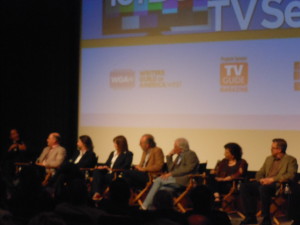 When you have Norman Lear and Carl Reiner in the house – two of television’s most brilliant, legendary creators who go back to the original golden age of the medium – it’s assuredly going to be a night to remember.
When you have Norman Lear and Carl Reiner in the house – two of television’s most brilliant, legendary creators who go back to the original golden age of the medium – it’s assuredly going to be a night to remember.
Hearing from those two giants was the shot across the bow as the Writers Guild of America revealed its 101 Best Written TV Series in a two-hour event at the WGA Theater in Beverly Hills on June 2, sponsored by TV Guide magazine.
Emceed by the witty and talented Merrill Markoe, the night was billed as a special tribute honoring seven decades of outstanding television writing and the writers who created some of the most memorable TV series of all time.
Writers get all the respect in television that they don’t in film, but as Markoe noted in her opening remarks, after working long hours they’re the ones you spot in the corner at wrap parties. There are also the ones with the driest senses of humor.
Before the countdown of the top shows began, Lear and Reiner regaled the sold-out crowd with anecdotes about Sid Caesar, Dick Van Dyke, Sheldon Leonard, Jerry Lewis, Dean Martin and Larry Gelbart, among others.
“When the Television Academy called me to tell me that I would be inducted into their Hall of Fame along with Edward R. Murrow, Lucille Ball, David Sarnoff and Milton Berle, I called my mother who said, ‘Well, if that’s what they want to do,’” Lear recalled, in one of several stories throughout the evening involving what could diplomatically be called non-supportive parents.
Reiner flashed back to the genesis of “The Dick Van Dyke Show,” which began as a program based on his life in New Rochelle, New York called “Head of the Family,” in which he starred – until Leonard told him, “We’ll get a better actor to play you.” The rest is television history.
Reiner’s comedy creation was deemed to be number 14 on the list, which was voted on by WGA East and West members, while Lear’s groundbreaking “All in the Family” came in at number four.
In addition to Reiner and Lear, James L. Brooks (“The Mary Tyler Moore Show,” “Taxi”), Gail Parent (“The Carol Burnett Show”), Steven Bochco (“Hill Street Blues,” “L.A. Law”), Matthew Weiner (“Mad Men”), Winnie Holzman (“My So-Called Life”), Vince Gilligan (“Breaking Bad “), Ronald D. Moore (“Star Trek,” “Battlestar Galactica”) and Steven Levitan (“Modern Family”) took the stage to speak about their shows, answer questions posed by Markoe and kibitz with each other.
Bochco reminisced about going to war with NBC on “Hill Street Blues,” which began its run in 1981 and went on to win four Primetime Emmy Awards for outstanding drama series, a record held only by three other shows, “Mad Men,” “L.A. Law” and “The West Wing.”
“The 1970s were like getting out of the 1950s,” he said. “The success of ‘Hill Street’ opened the floodgates for drama, language, adult situations, ethnicity and urban landscapes. It was an opportunity to make a show that humanized cops and showed them as complicated people. Because it worked, everyone started doing it.”
Brooks had the crowd in stitches when he said that he was told early in his career by people that went unnamed that three things didn’t work on television – divorce, men with mustaches and Jews. He lauded CBS president Bob Wood, who ran the Eye from 1969-1976, as a game-changing executive who canceled popular shows of the corn-fed variety to put on programs including “M*A*S*H*,” “The Mary Tyler Moore Show” and “All in the Family.”
“Before that, on shows like ‘The Beverly Hillbillies’ and ‘Green Acres,’ the biggest problems families faced were a burnt pot roast with the boss coming to dinner or a dented fender,” said Lear.
Parent recalled that she was warned that writers’ rooms were filthy, in terms of the language. “I thought that was a perk,” she said. Of the ten writers on Carol Burnett’s show, she was the only woman. Looking back, she called herself and Burnett rather meek, saying they didn’t push feminism at the time.
Moving into the 1980s, Bochco said the decade was defined by empowered writers and the emerging trend of compelling television involving a story arc over time, which continues to this day.
Both Gilligan and Weiner discussed their journeys in getting their respective programs made, both of which deal with “difficult” subject matter, yet have garnered huge success on basic cable’s AMC.
No one was interested in Weiner’s script, he said, but he was determined to get it to David Chase, who then offered him a writer’s job on “The Sopranos.” “It took six months to get it to David,” Weiner said. “Four and a half years later, AMC made the pilot.”
Gilligan spent seven years on “The X-Files” and said he didn’t censor himself when coming up with the idea for “Breaking Bad,” even though he knew there would only be a few players who would possibly be interested, which he identified as HBO, Showtime, F-X and TNT.
“TNT wanted me to change meth to counterfeiting,” he said. “They were very respectful when they said no, but that’s the second best thing you hope for from a pitch. If you don’t get a yes– a quick, respectful, no.”
These shows earned enough “yes” votes to make the top 10: “The Sopranos,” “Seinfeld,” “The Twilight Zone,” “All in the Family,” “M*A*S*H*,” “The Mary Tyler Moore Show,” “Mad Men,” “Cheers,” “The Wire” and “The West Wing,” of which “Mad Men” is the only one still unspooling original content.
The complete list is here: http://wga.org/content/default.aspx?id=4925

